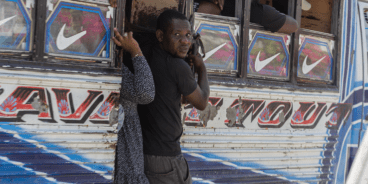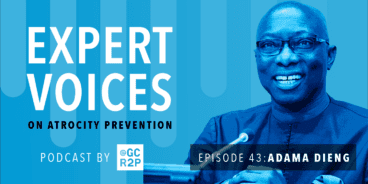
A familiar sick feeling
This article written by Evan Cinq-Mars was originally published in the Ottawa Citizen.
‘It’s a black hole in Africa” was how one diplomat put it. “The country has been abandoned to its fate,” another said. They were referring to the Central African Republic, a country of 4.6 million teetering close to state failure.
CAR has been described by one United Nations official as a “tinderbox that can ignite into something very, very big and very, very bad.” The situation has spiralled out of control to the extent that UN officials are now warning of the risk of genocide between Muslims and Christians.
Despite the alarm bells, a familiar script is being written in New York. The UN Security Council has been warned. Condemnatory statements have been made. In the end, the tragic scripts of Rwanda, Srebrenica and Darfur may be rewritten in Central Africa.
It should not be this way. In 2005, every country in the world agreed to the Responsibility to Protect (R2P) civilians from genocide, war crimes, ethnic cleansing and crimes against humanity. That responsibility applies to populations in the Central African Republic, even if most can’t place it on a map.
The country has suffered an agonizing collapse since a March 2013 coup by the Séléka rebel alliance overthrew the government of former president François Bozizé. Séléka fighters, many of whom hail from neighbouring Chad and Sudan, have committed widespread abuses, including torture, rape, indiscriminate shelling of civilian populations and the forcible conscription of child soldiers. Their latest despicable act was the massacre of 18 helpless women and children, huddling for their lives in a straw hut.
Séléka fighters, who are predominantly Muslim, have exacted much of this violence on Christian communities. In response, Christians have formed local self-defence groups called “anti-balaka” (anti-machete). They have attacked Muslim communities in revenge, threatening a truly horrific sectarian bloodbath.
To make matters worse, the Lord’s Resistance Army (LRA), led by the infamous Joseph Kony, is active in eastern CAR, killing and abducting civilians.
Compounding the endemic insecurity is a severe humanitarian emergency. The UN estimates 1.6 million Central Africans are in urgent need of humanitarian assistance. More than 394,000 have been displaced internally, and over 65,000 have sought refuge in neighbouring countries.
Attempting to keep the non-existent peace are troops from the little-known Economic Community of Central African States. They are underfunded, under-resourced, largely unable to deploy outside of the capital, Bangui, and facing a shortfall of nearly 1,000 troops. An agreement has been struck for the African Union to assume control of the force, but there is little doubt that it will be unable to stabilize the country and protect civilians.
The UN Security Council is speaking with one voice over the extent of their concern with CAR. But their agreement stops there, as the five permanent members are at odds over how to best respond to the deteriorating situation.
France, the former colonial power and strongest voice on the Council on CAR, wants greater UN support and the eventual transition to UN peacekeeping operation. The U.S. is concerned about the financial burdens that both of these options entail. The United Kingdom is intent on evaluating all options, while the Russians and the Chinese have adopted a hands-off approach that is emblematic when no vested interests are at stake. The gaps among all five are far from closing.
As the Council sorts itself out and deliberates, CAR continues to collapse. Violence is erupting sporadically throughout Bangui, threatening a fragile calm.
In Bossangoa, in western CAR, nearly 40,000 Christians sheltered in the local mission fear slaughter at the hands of the Séléka, while their Muslim neighbours fear the same from the anti-balaka.
The Security Council faces a stark choice. Its members can either act collectively and decisively to prevent mass atrocities, or they can allow frugality and indifference to condone further killings, provide haven for transitional criminal networks and terrorists, and destabilize conflictravaged Central Africa.
Avoiding the latter is both morally right and strategically wise. Two steps will have an immediate impact. First, the Council should authorize the transition of the African-led force to a UN-led operation with a protection-of-civilians mandate. Second, the Council should call for stepped-up bilateral and multilateral support to Misca ( Mission internationale de soutien à la Centrafrique) to fill the interim gap as the UN plans and deploys.
Failing to act in CAR today will make it harder — and more costly — to do so tomorrow. Decision-makers at the Security Council and in the capitals of its permanent members know this. It’s time they come together and get “Never Again” right in the Central African Republic.
Related Content


Atrocity Alert No. 439: Haiti, Central African Republic and Israel and the Occupied Palestinian Territory
